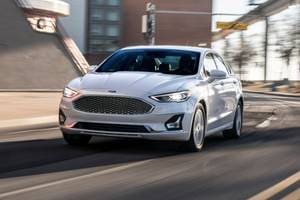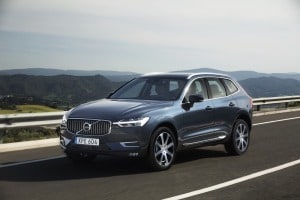Edmunds' CEO Gives Consumers A Voice On CAFE

The proposed Corporate Average Fuel Economy (CAFE) standards are the subject of a Congressional hearing Wednesday, and I will be testifying. Congressman Jim Jordan, who chairs the House Subcommittee on Regulatory Affairs, Stimulus Oversight and Government Spending, will lead the hearing, which carries the official title of “Running on Empty: How the Obama Administration's Green Energy Gamble will Impact Small Business and Consumers.” I will be testifying as to the consumer angle. But there will also be some interesting testimony covering the process by which the standards were developed. It seems regulatory agencies must follow certain rules when making rules, with the Administrative Procedures Act, being one. Apparently, the deal President Obama announced might not have all its procedural “I's” dotted and “Ts” crossed.
It is also interesting how the emphasis with CAFE is shifting from the National Highway Traffic Safety Administration (NHSTA) to the Environmental Protection Agency (EPA.) Part of this is because the EPA has far greater leeway when drafting rules than does NHSTA. Another factor is that it was the EPA waiver granted to the California Air Resources Board that created the leverage for the Administration to get the automakers on board. When you look at what has been released about the proposed standards, emissions do seem to be taking precedence over mpg.
A fair amount of this is political theater, but there should be enough substance to make things interesting. After the hearings I will file a commentary with my impressions. Meanwhile, here is my submitted testimony:
Chairman Jordan, Ranking Member Kucinich and members of the committee, thank you for the opportunity to speak today on this most important issue. I have been tracking the progress of these soon-to-be proposed CAFE standards with a growing level of concern. Some of this concern comes from a conviction that setting standards -- which are essentially a set of manufacturing quotas -- is a poor way to achieve the worthwhile goal of reducing emissions.
CAFE also seems to be growing ever more complex, a recipe sure to yield inefficiency and unintended outcomes.
My comments this morning will focus on one particular concern. One we at Edmunds think about everyday and that is the automotive consumer.
I have three points to make this morning.
The first is that -- up until now -- consumers have been either ignored or misrepresented.
The second is that consumers matter.
The third is that consumers are definitely not on board.
The evidence that consumers have been ignored is everywhere. One of the clearest is this interim technical assessment prepared by EPA that listed the CAFE stakeholders. These included environmental groups, auto firms, labor unions, etc. Even EV charging firms were seen as needing a seat at the table. But not the consumer.

Consumers matter because responding to their needs is what drives innovation and innovation is what should drive our economy. They matter because at the end of the day, they are the ones who will be asked to buy and drive the vehicles our government is potentially demanding the car companies build.
Most importantly, let me emphasize the consumer is not on board with the proposed standards. Now, I know there have been polls showing consumers “want” higher mileage standards. These polls are worse than meaningless; they are grossly misleading. Instead of polls, we should first and foremost be guided by what consumers are actually doing; by actual purchases. In the U.S. market, consumers have demonstrated a marked preference for larger vehicles, illustrated by sales as recently as last month.

Even when we look at sales within each segment, we see that sales are skewed towards vehicles with lower MPG.

A particular caution exists around the new, higher tech/higher mileage vehicles that have been introduced -- the very vehicles that the administration seems determined to mandate through the proposed CAFE standards. In these instances, it is not the car company that has not been “getting it.” They are delivering the goods. It is the consumer that is not interested.

In several cases cars are selling slowly even after large tax credits have been offered. Further evidence of the consumer's lack of sensitivity to fuel economy can be seen from the low take rates of hybrids for models with both standard and hybrid power trains available. Typical is the sales spilt for the Toyota Camry. The standard Camry, with 26 combined mpg, sold over 313,000 vehicles last year, the hybrid version, with a combined mpg of 33, only added less than 15,000. (For a share of sales of less than 5%.)

We also have to consider the possibility that the market demand for EVs and hybrids is already being met. This would suggest that future offerings would not grow overall sales; they will just be shared among a greater number of models.
Any study of actual sales makes clear that — for the vast majority of consumers — fuel economy is simply not their primary motivating factor when purchasing a vehicle. It doesn't mean they don't care about fuel economy — just that other things are far more important.
Consumers decide which vehicle to buy based on a weighing of vehicle features and a judgment on which set of features best meets their needs. In other words, they make trade-offs. Price and fuel economy, for most consumers, represent costs. Passenger capacity, cargo space, towing ability, etc. represent features. Consumers are happy to pay less, or save fuel, but not if it means giving up features they deem important. This is key.
Edmunds can add a special clarity around this issue of consumer preferences and demand. Among our many data sets, we have a market simulation model that was developed working with leading academics. This simulator can also be used to show how consumers weight various vehicle attributes in terms of importance. Following are the results of an analysis we ran for this committee. Note that vehicle mileage accounts for only about 6% of why consumers purchased a particular vehicle.

As you would expect, the weighting does vary among vehicle categories.

An argument has been made that consumers are better off with higher standards because any higher prices paid for vehicles will be made up for through savings at the pump. Any such conclusion depends heavily on the premium paid, the price of fuel and even if the consumer will own the vehicle long enough to enjoy any notional net savings.
Looking at the models where there is a hybrid and standard powertrain option, the current payback period runs between 6-9 years.

Math aside, consumers demand payback periods far shorter than any models suggest will be forthcoming. Our market model shows that over half of consumers demand a payback period of 12 months, or less. Some might find this frustratingly irrational. My view is that it just shows that most consumers are not making purchase decisions based on fuel economy.
An obvious factor that can influence these consumer weightings of mileage importance is the price of fuel. I have seen that when fuel prices jump there is an increase in the number of consumers who consider smaller vehicles and in some cases buy them. But these effects are not as dramatic as I have seen claimed. Further, they have been short-lived as consumers have quickly shifted back to larger vehicles, either because they grew accustomed to the higher price, fuel prices dropped, or a bit of both.
Looking at this data, an argument can be made that if fuel prices increased sufficiently, market demand could align with future CAFE standards. This is an interesting point but the increase — around a doubling of today's price — would need to be far higher than even the most extreme forecasts deem likely. And we should also consider the chance that fuel prices in the mid-term could actually be lower than prices seen today.

I do have some good news: looking back, the auto industry seems to have delivered the impossible. They have added features, increased safety, elevated performance — and delivered increased fuel economy. Much of this during a period when CAFE standards were stable. I credit mostly the advance of technology and expect this progress to continue. But if mandates trigger an escalation of prices, a reduction in consumer utility or the adoption of technologies before they have been proven, consumers will react. We saw this play out before in the late Seventies and early Eighties when the domestic auto industry, torn between mandates for greater fuel efficiency and consumer demand for larger vehicles, introduced a generation of truly awful vehicles. The reputational damage from this era lingers today.
Push too far, too fast and we could easily destabilize an industry that is a vital engine of our collective prosperity.
Jeremy Anwyl: Vice Chairman of Edmunds.com. Follow @JeremyAnwyl on Twitter.





